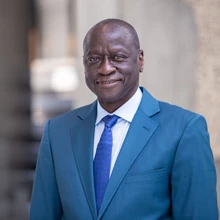 A man waters his fields in Niger. Photo credit: Ollivier Girard/World Bank.
A man waters his fields in Niger. Photo credit: Ollivier Girard/World Bank.
Water is not just about survival; it is about prosperity.
In low-income countries, over half of all jobs depend on water. In Sub-Saharan Africa, that number rises to 62 percent. When rainfall drops, so does gross domestic product, highlighting just how vital water is to lives, work, and growth.
Today, one in 10 people around the world live in regions facing high or critical water stress. Over the last 50 years, periods of severe rain shortfall globally have increased by more than 230 percent.
In the face of these challenges, many communities across West Africa are navigating shifting rainfall patterns and diminishing water resources with remarkable resilience, creativity, and local knowledge. Their experiences offer valuable insights into how economies can adapt and thrive amid these changing ecological conditions.
In the Sahel particularly, where the large majority of agriculture depends on rain, every drop counts. This heavy reliance on rainfall makes the region especially vulnerable to climate shocks, causing instability in both household earnings and the cost of food. Temperatures in the Sahel are projected to rise about 1.5 times the global average, a multiplier that increases the frequency and severity of droughts, floods, and heatwaves and places additional strain on services and spending. These pressures are felt in everything from household budgets to national accounts.
Even so, regional cooperation has shown that shared action can drive change. A decade ago, governments set a common course through the Dakar Declaration, aiming to expand irrigated land from 400,000 to 1,000,000 hectares by 2020 to help strengthen resilience, food security, and economic prosperity in the Sahel. Since then, about 285,000 hectares have been brought under reliable service, generating lessons on how to keep systems running, organize farmer groups, and finance operation and maintenance sustainably.
In April 2025, Sahel countries adopted the Sahel Irrigation Strategy (“Dakar +10”), a shared plan with milestones through 2055. Its goals include scaling up high-performing, sustainable irrigation, better integrating shared and groundwater resources, and improving food security through coordinated action.
This week in Ouagadougou, Burkina Faso, marked the beginning of another new chapter. The World Bank Group, together with the Government of Burkina Faso and the International Institute for Water and Environmental Engineering (2iE), launched the Defying Drought Impact Program to help countries scale up drought-resilience measures. The first cohort from Burkina Faso, Chad, Mali, Mauritania, Niger, and Senegal will work with peers and experts to adapt proven measures to their national systems, turning good practices into scalable and country-owned action. While the Sahel serves as the starting point, the approaches developed here will inform drought resilience efforts across Africa and beyond, offering insights for any region facing water stress.
The program builds on what we know already works. Experience across the region points to practical measures that reduce losses during dry years. Stronger monitoring and forecasting help turn data into timely advice. Early warnings enable pastoralists and farmers to move herds and adjust planting decisions. Keeping irrigation systems productive through better service and operations protects previous investments. Water storage and watershed measures stretch each rainy season, while improved food storage and smoother regional trade help cushion price spikes when production drops in one area but not another. These are not new ideas but they are lessons that have been refined by practitioners, tested in programs across the region, and strengthened by shared evidence.
The Defying Drought Impact Program is being implemented through the World Bank Group Academy, a global initiative designed to accelerate workable, results-driven solutions to development challenges. It’s also part of a larger capacity building initiative for the Africa region with the support of the Global Water Security and Sanitation Partnership.
To anchor this effort, together with partners we have committed to establishing the Africa Water Center hosted at 2iE. This center will support innovation, knowledge exchange, and professional development for Africa’s water workforce, turning evidence and experience into capacity so countries can manage their water resources more effectively over the long term. The World Bank will contribute tools and lessons from our operations.
The Defying Drought Impact Program and the Africa Water Center are ways to put collective knowledge to work—through peer exchange, practical training, and financing that helps public budgets reach further. The aim is to build skills and institutions, manage shocks before they amplify, keep food affordable, protect herds and livelihoods, and create dignified work in water and land management. By sharing expertise across borders, communities, and disciplines, countries can anticipate and manage drought before it deepens its impacts, protecting food systems, livelihoods, and economic stability.
The exchange of knowledge has long driven progress in the Sahel. Today, the same spirit of collaboration can turn shared struggle into shared strength. What begins here will ripple outward. Lessons tested, refined, and proven in the Sahel can strengthen how countries across Africa and around the world prepare for and manage drought.
This piece was originally published in Afrimag.



Join the Conversation